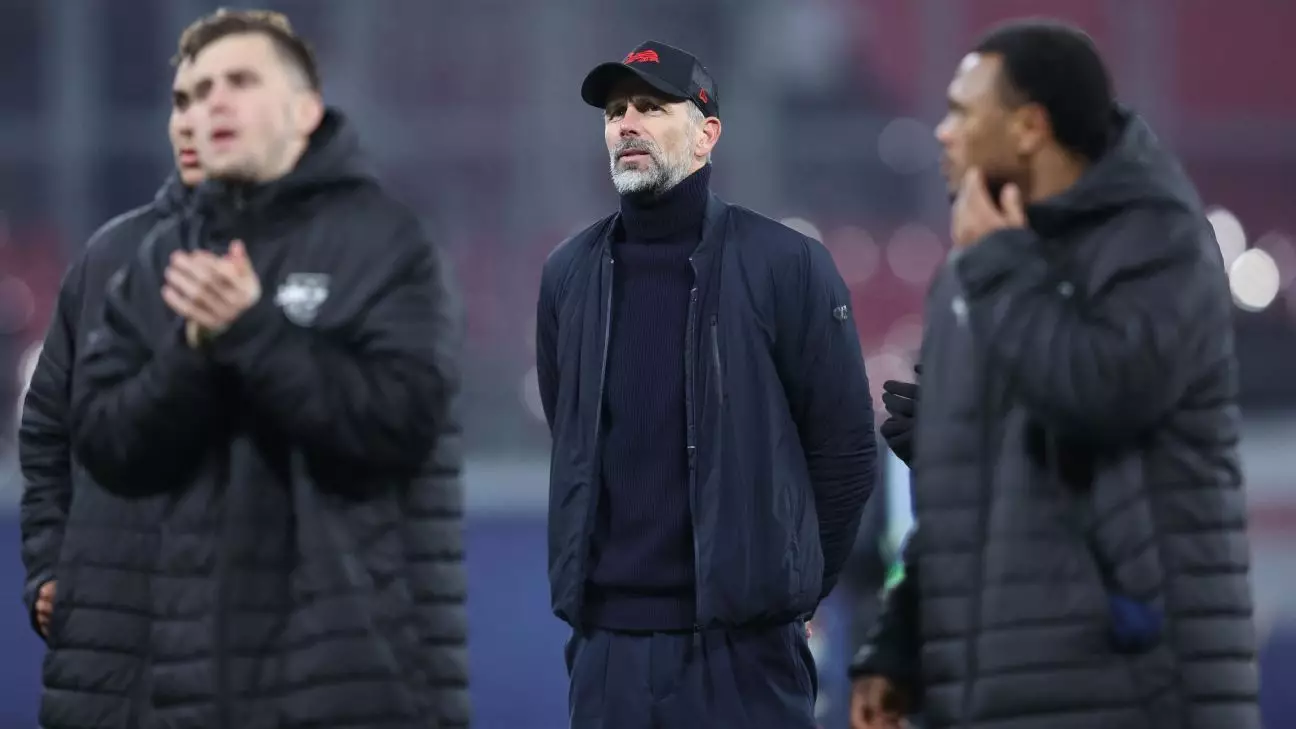In the intricate world of professional football, the verb “passen” holds significant weight, signifying the critical relationship between a coach and their team. In the case of Marco Rose and RB Leipzig, this connection is profound. Rose, a native of Leipzig and former coach at RB Salzburg, embodies the club’s ethos and style. His intimate understanding of the Red Bull philosophy sets him apart in a lineage of coaches who have occupied the Leipzig bench. Unlike his predecessors, Rose’s strategic approach is versatile, integrating both Gegenpressing and transitional play, while also prompting adaptability based on the situation at hand. This flexibility is a hallmark of his coaching identity.
Since his appointment, Rose has witnessed a relatively stable tenure, lasting over 800 days. This duration places him second only to Alexander Zorniger in terms of longevity since Leipzig’s inception in 2009. When Oliver Mintzlaff, the club’s decision-maker, took the reins, the organization’s tendency leaned towards quick firings during times of distress. Both Jesse Marsch and Domenico Tedesco faced the brunt of this approach, despite Tedesco delivering the DFB-Pokal in 2022. Consequently, the recent success, including another Pokal victory in 2023, reinforces the narrative of progress under Rose’s direction.
The newly reformatted UEFA Champions League represented a substantial opportunity for RB Leipzig to showcase their talents against Europe’s elite. However, this season has been a disheartening chapter for the team. With a dismal record of six defeats in six matches, the circumstances of this campaign reflect the harsh realities faced by clubs harboring ambitious growth plans. While some defeats can be attributed to misfortune against powerhouse teams like Atletico Madrid and Juventus, losing to Celtic Park marked a significant low point in Leipzig’s European aspirations. Such setbacks fuel discussions around the club’s strategic direction, particularly in light of injuries sustained by key players like Xavi Simons and David Raum.
As the DFB-Pokal quarterfinal against Eintracht Frankfurt approached, the stakes could not have been higher. This match was pivotal for Rose, carrying the weight of expectations that could redefine his role at the helm. Fortunately for him, Leipzig delivered a stunning performance that hinted at a possible resurgence, effectively changing the narrative regarding his future temporarily.
However, as the winter pause nears, the speculation surrounding Rose’s position is reigniting. The football community is keenly aware of Roger Schmidt, another figure with Red Bull ties, who remains available and has previously engaged in discussions with Mintzlaff. Additionally, Erik ten Hag’s name has surfaced within German football circles, with many retaining a favorable impression of his capabilities despite the troubles he faces at Manchester United.
Moreover, with Jürgen Klopp expected to take on a prominent global role within Red Bull, there could be a strategic overhaul that influences the decision-making dynamics at Leipzig. The intimate history between Klopp and Rose—fostered during their time together at Mainz—complicates matters, especially when considering whether Klopp would advocate for the dismissal of an ally.
Despite the overarching turbulence, RB Leipzig enters the DFB-Pokal quarterfinal draw with aspirations of clinching their third title in four years. The exits of leading Bundesliga teams like Bayern Munich, Borussia Dortmund, and Eintracht Frankfurt add a silver lining to their prospects. Bayer Leverkusen, having demonstrated impressive form with a string of victories, will undoubtedly be a formidable opponent. Their evolving tactical adaptability under Xabi Alonso keeps observers guessing, further amplifying the suspense surrounding the upcoming knockout matches.
Furthermore, the historical format of the DFB-Pokal that favors lower-tier teams brings an exciting unpredictability. For instance, Arminia Bielefeld’s remarkable journey in the tournament, including victories over established Bundesliga clubs, captivates fans and spotlight this tradition of allowing lower division sides to host matches at their home grounds.
Turning to the relegation battle, St. Pauli showcases resilience amid uncertainties surrounding other teams like Holstein Kiel and VfL Bochum. The Kiezkicker’s defensive solidity juxtaposed against the prior concerns about their attacking capabilities now indicates a more secure footing in the league. Manager Alexander Blessin’s tactics have begun to yield results, pointing to the potential for survival that was once doubted as a certainty.
While the removal of key players like Morgan Guilavogui due to suspension poses challenges, St. Pauli’s recent performances signal their capacity to hold their ground against the bottom-tier teams. The relegation race thickens as the club continues to pick up points in tight encounters, further suggesting that their position in the Bundesliga is currently solid, leading to a surge of optimism among their supporters.
As football continues to unfold in Germany, the intricate tapestry of triumphs, setbacks, and tactical evolutions will play out, leaving observers eager to witness what the future holds for clubs such as RB Leipzig and St. Pauli.

